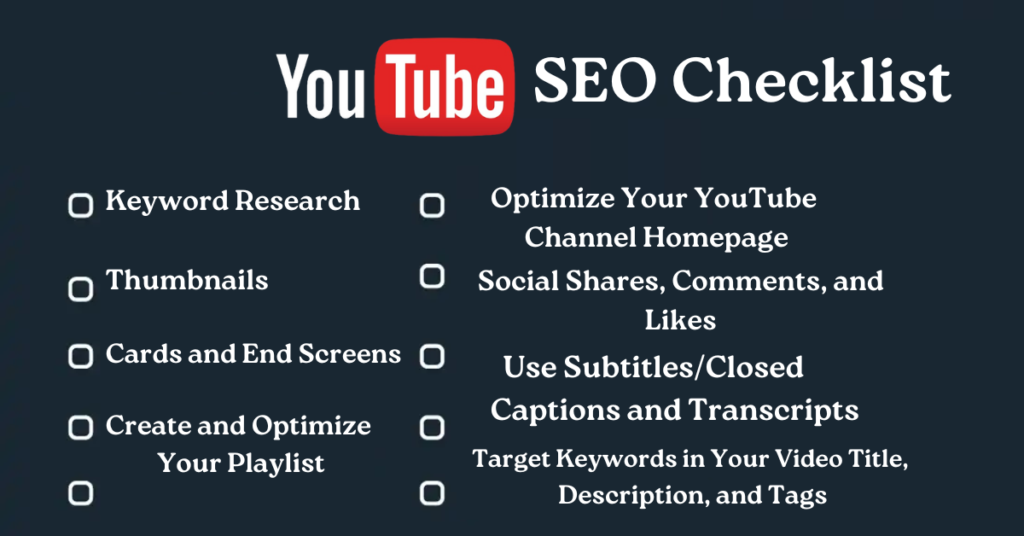A well-crafted YouTube SEO Checklist is vital for maximizing your videos visibility on YouTube in 2026. By leveraging targeted SEO strategies, you can improve your content’s ranking in search results and the recommended video feed, directly impacting views, engagement, and conversions. Understanding and applying these SEO practices will ensure your videos stand out on the platform, reaching a broader audience and achieving better performance.
How do you do SEO on YouTube?
Performing SEO on YouTube requires a comprehensive strategy that integrates into all facets of video production and promotion, including effective YouTube video editing. This includes conducting thorough keyword research to identify what your target audience is searching for, optimizing video titles, descriptions, and tags with relevant keywords, and ensuring your video content is engaging to influence viewer behavior positively.
Additionally, custom thumbnails and strategic use of closed captions and subtitles can further enhance your video’s visibility and attractiveness to YouTube’s algorithm, making it more likely to be discovered by potential viewers.
Understanding YouTube’s Algorithm
YouTube’s algorithm aims to connect viewers with videos they’ll find most engaging by analyzing various factors. It considers the relevance of a video to a user’s search queries or viewing history, as well as engagement indicators such as likes, comments, shares, and the amount of time viewers spend watching a video.
Additionally, the algorithm favors newer, fresher content alongside these engagement metrics. Optimizing your videos for these aspects enhances your visibility in YouTube’s search and recommendation systems, helping you attract a wider, more targeted audience.
What are the benefits of YouTube SEO?
The benefits of YouTube SEO are manifold. Firstly, it significantly improves your video’s visibility, making it easier for your target audience to find your content amidst a sea of competitors. This increased visibility translates to higher views, longer watch times, and more engagement, all of which are key metrics in YouTube’s ranking algorithm.
Moreover, effective YouTube SEO can lead to better audience retention, higher conversion rates, and increased channel subscriptions, contributing to long-term growth and success on the platform.
Increases Overall Visibility
Optimizing YouTube content for search ensures maximum visibility. By strategically incorporating relevant keywords into titles, descriptions, and tags, videos have a higher chance of appearing in search results. This broader exposure not only increases the likelihood of discovery by new audiences but also ensures that content is seen by those actively seeking similar topics, thus amplifying overall visibility and potential reach.
Boosts Engagement
YouTube SEO drives higher engagement by attracting genuinely interested viewers. When titles, descriptions, and tags accurately reflect video content, they resonate with target audiences, encouraging longer watch times, increased comments, shares, and likes. This tailored approach fosters a more engaged community around the content, stimulating ongoing interaction and fostering loyalty among viewers.
Drives Traffic
Effective YouTube SEO tactics not only attract viewers to videos but also channel traffic to external platforms. By optimizing videos for search, they appear more frequently in YouTube search results and suggested videos, enticing viewers to click through. Additionally, including links in video descriptions directs traffic to websites or other online platforms, expanding the brand’s online presence beyond YouTube and increasing overall traffic.
Builds Brand Awareness
YouTube SEO contributes to brand recognition by optimizing content for visibility. By consistently producing high-quality, relevant videos optimized for search, brands position themselves as authoritative within their niche. This increased visibility not only boosts brand awareness among potential viewers but also fosters credibility and trust, laying the foundation for long-term brand recognition and loyalty.
Improves Conversions
Optimizing YouTube content for search drives higher conversion rates. By targeting specific keywords and topics, videos attract viewers genuinely interested in the content, increasing the likelihood of desired actions such as subscribing, signing up, or making a purchase. Incorporating relevant calls-to-action in video descriptions further guides viewers towards conversion, ultimately translating engagement into tangible business outcomes.
YouTube SEO Checklist
Keyword Research
Begin with thorough keyword research to understand what your target audience is searching for. Tools like Google’s Keyword Planner and YouTube’s Search Suggest feature can provide insights into popular and relevant search terms.
- Begin with thorough keyword research to understand what your target audience is searching for.
- Use tools like Google’s Keyword Planner and YouTube’s Search Suggest feature to provide insights into popular and relevant search terms.
Target Keywords in Your Video Title, Description, and Tags
Incorporate your primary keyword naturally into your video’s title, description, and tags. This helps YouTube understand your video’s content and context, making it more likely to show up in relevant searches.
- Incorporate your primary keyword naturally into your video’s title to attract immediate attention and relevance.
- Extend the use of your keyword into the video description, weaving it seamlessly into comprehensive and informative text.
- Tag your video with the primary keyword and relevant variations. This helps YouTube further understand your video’s content and context, increasing the likelihood of it appearing in relevant searches.
Use Subtitles/Closed Captions and Transcripts
Adding subtitles and transcripts not only makes your content accessible to a wider audience but also provides additional text for YouTube to index, enhancing your SEO.
- Make your content accessible to a wider audience by adding subtitles and transcripts.
- Provide additional text for YouTube to index, enhancing your SEO through subtitles and transcripts. This approach helps improve your video’s discoverability and inclusivity.
Social Shares, Comments, and Likes
Encourage viewers to engage with your content through likes, comments, and shares. High engagement rates signal to YouTube that your content is valuable and engaging, boosting its visibility.
- Encourage viewers to engage with your content by prompting them to like, comment on, and share your videos.
- Understand that high engagement rates act as a signal to YouTube, indicating that your content is valuable and engaging to viewers.
- Boost your video’s visibility on the platform by leveraging the power of social interactions.
Thumbnails
Create eye-catching and relevant thumbnails to improve your click-through rate (CTR). A high CTR indicates to YouTube that your video is a good match for viewers’ interests.
- Create eye-catching and relevant thumbnails to capture the attention of potential viewers.
- Improve your click-through rate (CTR) by designing thumbnails that stand out and clearly communicate the essence of your video.
- Understand that a high CTR signals to YouTube that your video is a good match for viewers’ interests, enhancing its visibility and ranking.
Cards and End Screens
Use cards and end screens to promote other videos, playlists, or your channel, keeping viewers engaged and on your channel longer.
- Incorporate end screens at the conclusion of your video to guide viewers towards additional content or to subscribe to your channel.
- Keep viewers engaged and on your channel longer by seamlessly integrating these features to encourage further viewing.
Promote Your Video on Social Platforms and Website

Amplify your video’s reach by promoting it on social media, your website, and other channels. This not only drives direct traffic but also contributes to higher engagement and visibility on YouTube.
- Utilize your website as a channel for video promotion, embedding videos where relevant to engage visitors.
- Leverage other channels you have access to for promoting your video, such as newsletters or blogs.
- Drive direct traffic to your video through these promotions, which can lead to higher engagement.
- Contribute to increased visibility on YouTube itself, as external traffic and engagement are positive signals to YouTube’s algorithm.
Create and Optimize Your Playlist
Playlists can improve watch time by organizing your videos into easy-to-consume series. Optimize your playlists with keywords to make them more discoverable.
- Improve watch time by organizing your videos into easy-to-consume series through playlists.
- Optimize your playlists with relevant keywords to ensure they are easily discoverable by your target audience.
- Enhance the organization of your channel and guide viewers through your content in a structured manner, increasing overall engagement.
Optimize Your YouTube Channel Homepage

Your channel homepage is often the first point of contact with potential subscribers. Make sure it’s well-organized, appealing, and optimized with keywords to attract and retain viewers.
- Recognize your channel homepage as often the first point of contact with potential subscribers. This initial impression is crucial.
- Ensure it’s well-organized to make navigation easy for viewers, helping them find what they’re looking for without frustration.
- Make your homepage appealing with visually compelling elements and a coherent design that reflects your brand or channel’s personality.
- Optimize with keywords in your channel description and video titles featured on the homepage to improve discoverability and attract targeted viewers.
- Focus on attracting and retaining viewers by providing a clear, engaging introduction to what your channel offers.
Conclusion
YouTube SEO is not a one-off task but an ongoing process that evolves with your content, audience, and the platform’s algorithm. By adhering to the strategies outlined in this guide, you can improve your video’s visibility, engage a broader audience, and harness the full potential of YouTube as a marketing channel. Remember, the key to success is consistency, creativity, and an unwavering focus on delivering value to your viewers. Incorporate these practices into your YouTube strategy, and watch as your channel grows, engaging and delighting viewers with every video you publish.
Frequently-Asked Questions (FAQS)
What are the key components of effective YouTube keyword research in 2026?
The key components include using advanced tools to uncover search trends and viewer preferences, focusing on keywords that your target audience is actively searching for, and integrating these keywords into your video titles, descriptions, and tags to maximize discoverability and relevance.
How can I optimize my video titles and descriptions for better SEO?
To optimize video titles, include relevant keywords while keeping them engaging and concise. For descriptions, provide a detailed overview of the video content, incorporating keywords naturally to enhance searchability. Both should aim to capture the viewer’s interest and provide clarity on the video’s value.
Why is audience engagement critical for YouTube SEO, and how can I improve it?
Audience engagement, including likes, comments, and shares, is critical because it signals to YouTube’s algorithm that viewers find the content valuable, boosting its ranking in search results. Improve engagement by actively encouraging viewers to interact with your content through calls to action, responding to comments, and creating community-driven content.
Can the quality of my videos affect my YouTube SEO?
Yes, the quality of your videos directly impacts viewer retention and engagement, which are key factors in YouTube’s ranking algorithm. High-quality video and audio production, coupled with professional editing, can significantly enhance viewer experience, encouraging longer watch times and positive interactions.
How do I use YouTube Analytics to improve my video SEO strategy?
Use YouTube Analytics to track viewer demographics, watch time, engagement rates, and other performance metrics. Analyze this data to understand what content resonates with your audience, identify areas for improvement, and adjust your full SEO Services tactics accordingly, such as optimizing your keyword strategy or focusing on topics that generate more engagement.

